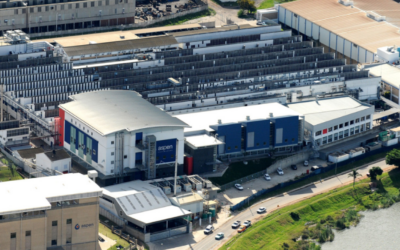The food manufacturing sector continues to fight valiantly in the face of mounting economic pressure compounded by the ongoing uncertainty and immense cost implications that increased COVID-19 infection rates might have on productivity. Now is the time for these businesses to radically rethink one of their biggest operational costs – energy consumption.
This is according to Cala van der Westhuizen, Head of Sales at EP Refrigeration – a division of Energy Partners and part of the PSG group of companies – who says that as an essential part of the country’s economy, food producers have been doing everything in their power to combat the losses and possible closures that loom in the wake of the global pandemic.
A possible consideration for food manufacturers to consider during these challenging economic times is the outsourcing of key utility services – which impact an operation’s power consumption and capital investment decisions. This can be massively beneficial to helping a business restructure and become much more efficient.
“While many companies are putting cost-saving measures in place and streamlining their operations for maximum efficiency, the fact is that the industry cannot fight this battle on its own. Completely outsourcing one of the industry’s biggest cost drivers to dedicated service providers could go a long way towards providing companies in this sector with practical and immediate cost reduction options as well as long-term cost efficiency horizons.”
As an example, he points out that for many food producers, refrigeration constitutes a large part of their operational costs. “More specifically, it makes up about 25 to 40% of costs in food production businesses, 35 to 50% for food retailers, and around 50 to 80% for food logistics services. The energy cost tied to operating inefficient or ageing refrigeration infrastructure can easily spiral out of control and cost a business even more in energy consumption over time. This places the business at even higher risk during tough times. Switching to cooling as a service (CaaS) is an extremely effective way of eliminating this risk.”
He explains that in a CaaS scenario, the business does not need to own any of the refrigeration infrastructure. Instead, a service provider owns and operates the refrigeration plant and sells the cooling produced at a guaranteed competitive cost. “There are several benefits to this approach. To start with, the service provider provides all of the upfront capital investment and assumes complete maintenance responsibility and risk related to the refrigeration plant. Secondly, the service provider can install state-of-the-art refrigeration systems without the need for the business to provide upfront capital. This reduces the amount of electricity consumed by the business as well as removing the risk of breakdowns and extended periods of downtime.”
As an example of the benefits that this could hold for food manufacturers, Van der Westhuizen cites the example of one of Energy Partners’ clients, Afrupro. “This fruit packing company was experiencing consistent problems with its existing industrial ammonia plant. Not only was it consuming excessive amounts of power, but the cold storage rooms were also operating above required temperatures as a result of the deteriorating system. Once we took over the ownership as well as the operation of their plant and invested in new infrastructure, we were able to reduce the energy cost of the site’s cold rooms by 20%. The contract also saved the company R3.7 million in capital expenditure.”
In addition, combining complementary outsourced utility services, such as renewable solar energy and steam generation, can have even greater beneficial effects, as in the example of Lynca Meats. The company engaged the services of Energy Partners for the outsourced production of solar energy, steam and refrigeration resulting in a reduction in the overall energy cost of more than 30%.
Lastly, Van der Westhuizen states that partnering with a service provider that allows one to make better business decisions through the intelligent application of data-led energy strategies, is crucial. “Data is central to ensuring that an operation can make better business decisions in relation to its energy consumption, which is why a service provider should be able to provide real-time energy monitoring and additional long-term energy efficiency strategies to reduce energy intensity. At Energy Partners, our Intelligence division does exactly that, as well as engage with electricity suppliers on behalf of the user to ensure that the business is always charged the lowest possible tariffs.”
In conclusion, reiterates that the costs that large food producers can save through these types of measures could make a significant difference in the amount of downsizing that may need to take place. “The costs saved could very well be channelled back into the business. At the end of the day, helping food producers to focus on their core business – while putting energy management in the hands of experienced service providers – could help this vital industry weather the current economic storm.”




